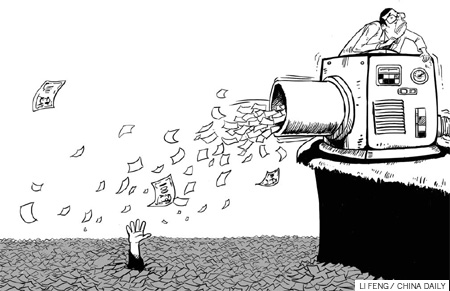View
Debate: High inflation
(China Daily)
Updated: 2010-11-30 08:04
 |
Large Medium Small |
Ma Hongman
Change in policy needed urgently
The State Council, China's Cabinet, issued a notice on Nov 20, asking local governments and relevant departments to take 16 immediate measures to stabilize prices and strengthen monitoring of the market to protect people from being further victimized by inflation.
The 16 measures include a stable supply of agricultural products, reforming the market pricing system and strengthening price monitoring and regulation to help the standards of social welfare keep pace with rising prices. The notice exempts vehicles carrying fresh agricultural products from paying road tolls and asks local governments to further standardize the market.
Prices of many products, from up-market consumer goods to agricultural products and other commodities, have been rising sharply. Though there are a variety of reasons for the increase in the prices of these goods, the fact is that they have affected people's consumption habits and daily life.
If effective measures are not taken immediately, inflation may intensify and the market order may suffer.
The notice focuses on industrial adjustments to ensure that the supply of products to the market increases. It introduces complementary measures to strengthen price monitoring and improve social security. And it lays special focus on developing and increasing agricultural production and reducing logistical cost of the agricultural industry to control the main causes of the price rise.
Prices have been rising in recent months because of insufficient supply of farm products as a result of continuous natural disasters across the country over the past year. These natural disasters have caused a fall in the output of agricultural products.
The price of green beans was one of the first to shoot up because its output dropped owing to the drought in Northeast China, the main producing region of green beans in China. The recent rise in cotton prices can be attributed to the bad weather, too.
But it is expected that the notice will help increase the output of farm products and gradually ease their prices. Plus, provisional subsidies and social security will help minimize the negative impact of inflation on society.
The phenomenon seen in the market today is special because prices of many products have been rising continuously or fluctuating according to the whims of the financial market. The more the prices rise, the more panicky the market gets with rumors such as shortage of supplies and falling productions acting as panic buttons. This has resulted, for example, in people hoarding cooking oil and instant noodles.
These developments suggest that people are very susceptible to strong inflationary pressure, and will act as a counter-force to the measures implemented to increase supplies and production of goods of everyday use. The more such measures are introduced, the more convinced people will be that there is a real shortage of such products and the more they will try to hoard them. And the more they hoard them, the greater the shortage will be of such products in the market.
Because of these factors, we cannot pin our hopes solely on measures to increase the production and supply of products, whose prices have been raised artificially. Rather, it is important to calm people's inflationary fears and change their perception that the shortage of a particular product in the market necessarily leads to rising prices.
To do that and introduce international practices, the Chinese government should change its monetary policy and adopt a prudent mechanism for pricing public goods. It should collect information on national and international agricultural production, too, and analyze them properly and take measures to keep away hot money from the market to protect the public.
The author is a Shanghai-based economic commentator.
